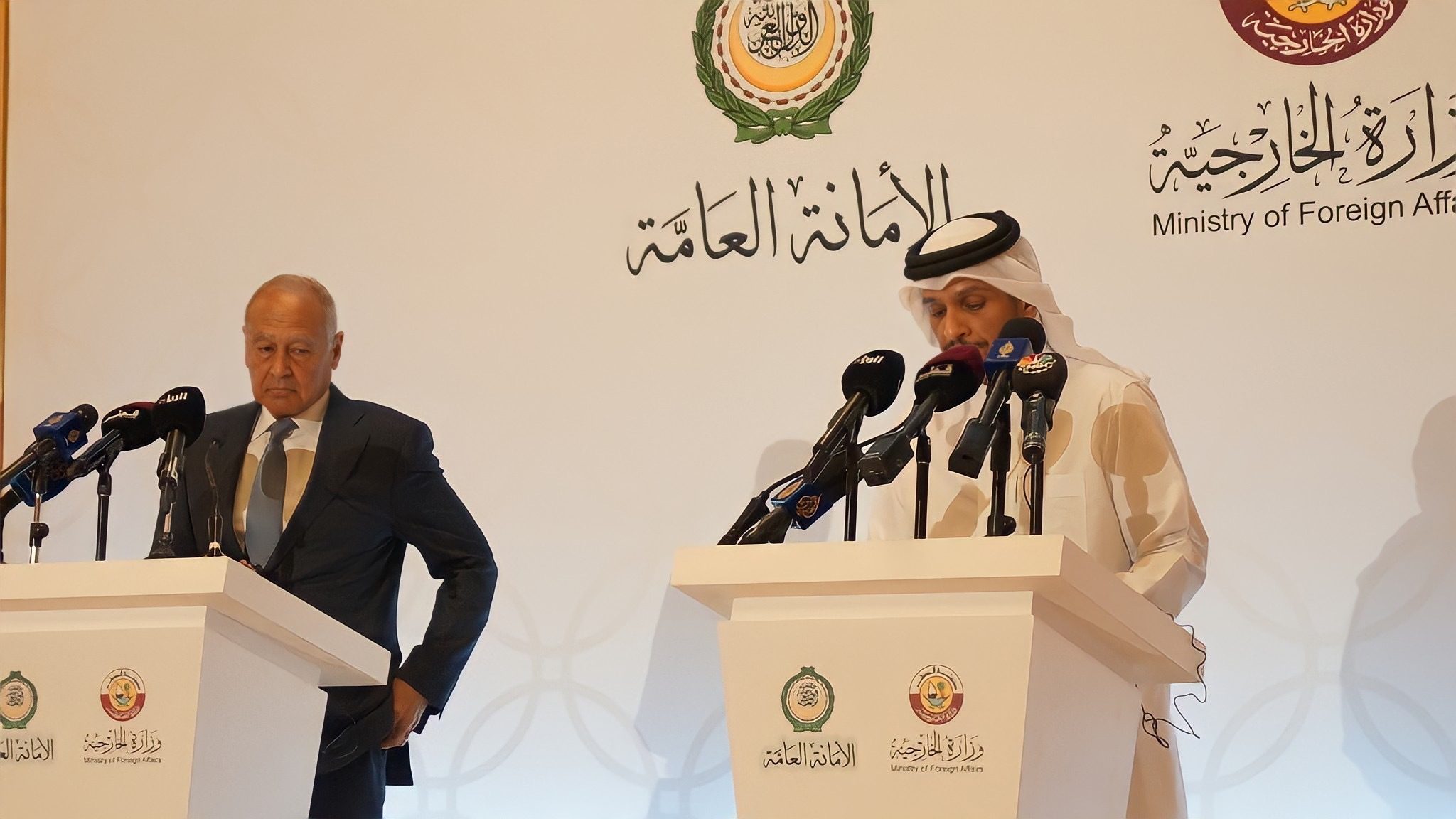The Arab League held a special session on the long-disputed Renaissance Dam, where members released a joint statement calling for protecting water security in both Sudan and Egypt.
The Arab League condemned a controversial Israeli Flag March in Jerusalem during the latest consultative session in Doha on Tuesday.
In a joint press statement released after the third session, which focused on the ongoing occupation of Palestine, members of the league expressed their concerns over Israel’s continuous provocations against Palestinians as a new government takes the reigns in Tel Aviv.
“We noticed that [the new Israeli government] started off with extremely negative statements about peace and the Palestinians and therefore we fully condemn them,” read one part of the statement.
Palestinian officials have described the march as “provocative”.
In a joint press conference with Secretary-General of the Arab League Ahmed Aboul Gheit, held after Tuesday’s meetings, Qatar’s Foreign Minister Sheikh Mohammed bin Abdulrahman Al Thani said that the diplomats also “agreed on steps that can be taken collectively to stop the Israeli violations in Jerusalem”.
He added that there was an agreement reached to make Jordan head a committee in charge of working towards stopping Israel’s continuous human rights abuses.
Responding to a question on Israel’s refusal to allow the entry of aid to the besieged Gaza strip following the 11-day offensive, Aboul Gheit renewed the league’s support to reconstruct the strip.
“We support any Egyptian, Arab or international effort to rebuild the Gaza Strip,” he said.
Since its establishment, the league has placed Palestine at the heart of its discussions and concerns.
Diplomats attending the consultative session also discussed the latest developments in Lebanon, which is currently struggling with its worst economic crisis since the civil war.
Syria was also on agenda, with members of the league touching on means to handle the ongoing crisis in the war-torn country. Syria was suspended from the league in 2011.
On the Renaissance Dam
Members of the Arab League also held a special session on the long-disputed Grand Ethiopian Renaissance Dam [GERD], where diplomats raised concerns over increasing tensions between Sudan, Egypt and Ethiopia.
In the joint statement, members stressed the importance of water security in Sudan and Egypt, saying it is an “integral part of Arab national security”.
“African mediation on the Renaissance Dam started about a year ago, but unfortunately it did not produce the desired results,” said Aboul Gheit during the press conference.
“I sensed clear and strong Arab support for Egypt and Sudan, given that the security of the two countries is part of Arab national security,” he added.
The League also expressed its gratitude towards South Africa for its efforts during its presidency of the African Union in to facilitate the course of the Renaissance Dam negotiations.
Read also: Qatar to hold Renaissance Dam talks as Egypt FM heads to Doha
Additionally, the statement called for reaching an “urgent, fair and balanced” consensus on the GERD that meets the interests of the three countries involved in the dispute.
“The Arab League urges mediation to ensure that no unilateral steps will harm Egypt or Sudan,” said Qatar’s foreign minister.
The Arab League’s statement went on to express its concerns over Ethiopia’s intention to continue to fill the dam during the upcoming flooding season in the summer of 2021, describing it as a violation of international law as well as an agreement between the three countries signed in 2015.
“[The Arab League] demands Ethiopia to stop any unilateral decision that could harm the interests of Egypt and Sudan, including filling the dam without reaching an agreement,” added the statement.
Aboul Gheit also announced that the Arab League has assigned a committee at the United Nations to coordinate work with the international bodies on matters related to the dam.
The joint statement called on Tunisia, Arab member of the Security Council, and the committee in place—consisting of Jordan, Saudi Arabia, Morocco and Iraq—to intensify its efforts in the GERD file by continuing to coordinate with Sudan and Egypt.
Egypt-Qatar ties
Qatar’s latest role in hosting the Arab League, attended by Egyptian Foreign Minister Sameh Shoukry during his first ever visit to the Gulf state since the blockade, further exemplified what is now seen as a new chapter in the countries’ bilateral ties.
“Qatar’s relations with Egypt is moving towards a positive path and we look forward to good relations with all Arab countries,” said Doha’s foreign minister.
The Gulf state’s mediating role in the GERD also exhibits the resumption of its ties with Egypt.
Egyptian President Abdelfattah El Sisi is expected to visit Qatar soon, as per invitation from Sheikh Tamim bin Hamad Al-Thani.
Formed in 1945, the now 76-year-old Arab League includes Qatar, Algeria, Bahrain, Comoros, Djibouti, Egypt, Iraq, Jordan, Kuwait, Lebanon, Libya, Mauritania, Morocco, Oman, Palestine, Saudi Arabia, Somalia, Sudan, Tunisia, the UAE, and Yemen.
Its members hold meetings twice a year and host emergency sessions upon the request of two members, a scenario that was presented during the recent 11-day Israeli bombardment of Gaza as well as the Renaissance Dam dispute between Egypt, Sudan and Ethiopia.
Follow Doha News on Twitter, Instagram, Facebook and Youtube







